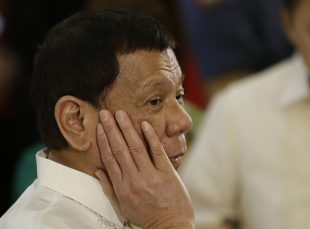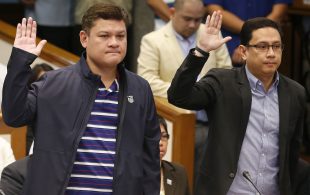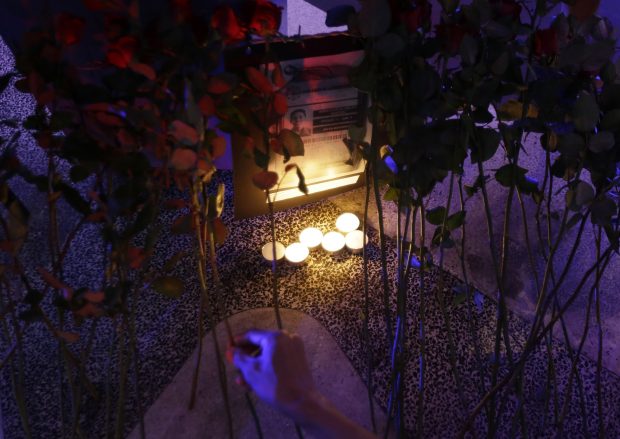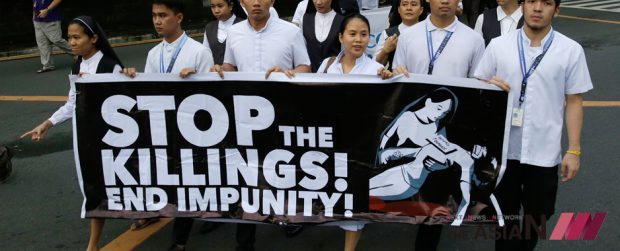Killing for a drug-free nation?
“I have been demonized”—the words of President Duterte on 25 October on the international accusation that his “War on Drugs” is a grave human rights violation. He continued in his statement, “I will assure you upon my oath as a lawyer and before God that some are true, some are not. And the extrajudicial tag that has been placed on me is simply not true.”
Having denied his involvement with illegal police action that has left many concerned over unlawful killings of those only slightly connected to drug use, Duterte has vowed to put an end to all operations in the deadly war campaign. According to police-revealed records, some 3,900 people have died in police inspections since July 2017, and of these, 2,100 deaths—widely considered murders—are linked to drug-related operations.
It seemed as if Duterte had finally resolved to bow down to critical opponents from the international society who have denounced Duterte’s authority for using tyrannical methods to solve domestic issues. And claiming that he would “satisfy those bleeding hearts” who were tormented by the crackdown, he removed the police from the drug war and placed the Philippine Drug Enforcement Agency (PDEA) in charge of what should now be referred to as “maintenance of drug abuse”.
PDEA members that reach 1,800 in number make up only 1% of Philippines strong national police force. With fewer staff to be employed and higher judicial limitations and court reviews for drug cases, the new order is said to significantly reduce extrajudicial killings.
Yet, even with this major campaign shift, few expect Duterte’s current administration to act differently. The President, nicknamed “the Punisher” for his extreme—if not bloodthirsty—way of tackling issues, had previously said that he is “happy to slaughter” millions of addicts, dismissing deaths of innocent children as unavoidable “collateral damage”.
And when 2,000 more people (besides the 3,900 killed in police reports) were accounted to have been killed during the police inspections, to which police have said were due to unexplained circumstances, Duterte denied any responsibility saying that he never told the police “to go out and just kill the criminals,” but only, “Go out, do not be afraid. I will support you [policemen].”
Abroad, the numbers have startled international organizations to the core. Multinational groups such as Human Rights Watch, Amnesty International, the UN-affiliated International Narcotics Control Board (INCB), the UN Office on Drugs and Crime, the European Union (EU), and the UN Commission for Human Rights have all harshly condemned Duterte and his faction for allowing killings to be administered without due process of law. The Human Rights Watch claim that the Philippine government has created a “human rights calamity”.
In October, the International Criminal Court based in Hague issued that it could possibly begin investigations on the Duterte administration if killings were “committed as part of a widespread or systematic attack against a civilian population.”
To bring the issue in light of its context and domestic opinion, the following gives an account of the beginning of Duterte’s war and the reasons behind what much of the global society argues to be uncontrolled mass homicide.

On wednesday, Aug. 16, 2017, Philippine President Rodrigo Duterte visits victims of fire at the Malacanang compound in Manila, Philippines. Philippine police say they have killed at least 26 more drug offenders in overnight gun battles in the capital which brought the death toll in the president’s renewed crackdown to 58 in the last three days.
Domestic Context
As he took office on June 20, 2016, for around 15 months, President Rodrigo Duterte formally announced his commitment to eradicating the nation of its poisonous drug business. And while opponents were still wondering what exactly he meant, the Philippine National Police began conducting a witch-hunt for any and all involved in the drug trade.
For most of Filipino society that was, by then, exhausted by a nation suffering from rampant corruption and severe economic inequality, Duterte was some sort of a national hero who would finally end the negative effects of a deeply-rooted system of drug abuse that was influencing every aspect of society.
Criminal groups were making huge illegal profits through trafficking drugs and finding ways out of government’s rule of law, all the while, sucking the nation of valuable economic assets and natural resources. Such illegal activities were said to be fueling more corruption, affecting the most vulnerable in society as more young people were being added to the list of drug abusers. In his campaigns for presidency, Duterte convinced supporters that he would protect the nation’s youth from further exposure to drugs.
12 years ago, in 2005, it was reported that almost 6% of the nation—around five million in number—were regular users of Shabu (national slang for methamphetamines)—at the time, this promoted the UN Office on Drugs and Crime to claim the Philippines to have the world’s highest methamphetamine prevalence rate.
Duterte referred to drug abusers by the term adik (addict), a word that has very negative connotations amongst Filipinos. Those involved with using drugs and particularly, methamphetamines, are considered beyond redemption. The President has said that “the continuous use of shabu would shrink the brain, making users no longer viable as human beings in this planet”.
Such negative sentiment is shared by the majority of the population, perhaps owed to the nation being 80% Catholic. Since as early as the 1970s, Filipino bishops described drug users as “mental and physical wrecks” who are “worthy of the highest punishments.” And for the most part, citizens have spurred on police inspections by posting anti-drug posters on private property with messages like “Get high on God, not on drugs,” urging users to “surrender or be arrested.”
Indeed, Duterte’s approval rating remains high at 82% (Pulse Asia June 2017 survey) with many worried about the deaths but assured that the drug crisis was being controlled.
At the height of his campaign, President Duterte had said, “Hitler massacred three million Jews…Now there’s three million drug addicts. There are. I’d be happy to slaughter them.” But official statistics showed a rather different story—in 2015, the Philippine Dangerous Drugs Board estimated a total of 1.8 million drug users, of them, only 859,000 were shown to be using shabu.
On the other side of the spectrum, those in the Philippines who oppose the Duterte crackdown oppose the campaign for targeting mostly poor addicts. People of higher income families remain largely unaffected by the drug war and thus have no negative opinion of the matter.
Moreover, Duterte opponents claim that if the strategy was truly effective, the price of shabu should be rising as less supply reaches the local streets, and yet while a gram of shabu cost 1,200-11,000 pesos ($24-$220 USD) in July 2016, the figures show that in May 2017, a gram cost 1,000-15,000 pesos ($20-$300). Such changes in cost of drugs have been an indecisive mark that Duterte’s police initiative has lessened national drug crisis.
Still, the public remained generally supportive, until August 16, 2017, when the police enacted a mass one-time rundown through Bulacan, situated north of Manila. The incident became the bloodiest yet of Duterte’s crackdown as police killed a total of 32 people in that single evening.
For many of these deaths, the police pleaded the people to understand that their violence was only enacted out of self-defense. Duterte said himself, “Why are they killed? Because a shabu user or a lieutenant of the shabu syndicate has always a gun.”
Two days later, the death of 17-year-old Karlos delos Santos brought thousands to the streets in protest against the government for killing a young boy whom many witnesses said was falsely accused of being a drug dealer. This time, like before, the police again claimed they killed Santos in self-defense, but a camera footage soon revealed that Santos was already in custody before he died—allowing no chance for the teenager to have gotten hold of any sort of weapon.
To make things worse, in September 2017, Paolo Duterte, the President’s son, was accused of smuggling $125 million worth of methamphetamine from China. Then, Manases Carpio, Duterte’s son-in-law, was put on trial for also being linked to the drug shipment from China. Both men have since denied all allegations and Duterte has himself strongly stated that he would have his son killed if accusations of drug trafficking proved true.

Paolo Duterte, left, the eldest son of President Rodrigo Duterte and the President’s son-in-law Manases Carpio, a lawyer, take their oaths in the continuing senate probe on the more than half a ton of the illegal drug methamphetamine hydrochloride, locally known as “Shabu” worth $128 million (P6.4 Billion Pesos) from China which passed through customs from China Thursday, Sept. 7, 2017, in Pasay city, southeast of Manila, Philippines.
Social impact and implications for 2018
The magnitude of these progressions has placed Duterte in a tight situation, resulting in the recent dismissal of police interference in the campaign. But it also speaks of a disjointed government that has yet to understand what must be done to handle drug abuse and stop the flow of narcotics entering the country.
Reluctant as they have been in admitting, the Duterte war is haunted by the possibility that killing off drug users may only be a placebo to a severe disease. Endemic issues within the Philippines remain highly linked to widespread poverty, corruption, and lack of education, in fact, numerous studies suggest that drug use is more often than not a part of the users’ social and physical environment, but it seems, the government has chosen the easy and quick method of what they felt to be the root of all evil, drugs.
President Duterte now relies on the PDEA, but he is unwavering in his stance that previous killings do not violate human rights. In an interview he said, “Crime against humanity? In the first place, are [addicts] humans? What is your definition of a human being? Drug users are beyond hope of rehabilitation anyway.”
And despite the Philippine’s trading ties with the European union, when the EU suggested rehabilitation for drug users, the President only exclaimed, “The EU, they communicated to us, and they want a health-based solution for the drugs. These sons of bitches,” adding that foreign organizations have no idea of the local issue he faces and that building rehabilitation centers has not helped in the past.
Meanwhile, U.S. President Donald Trump is scheduled to visit the Philippines November this year as part of his attendance of the Association of Southeast Asian Nations (ASEAN) Summit. His purpose in stopping by the Philippines is directed at addressing the war on drugs, but quite interestingly, the U.S. President has previously praised Duterte for doing an “unbelievable job” in his fight against illegal drugs.
The consequences of the war on drugs is uncertain. To decipher the matter would be to unroot the multifaceted issues that come with any nation to say the least, and pivots on the question of whether the global society even has a say in how a leader of an independent nation should act.
For the moment, it seems that international organizations have somewhat accepted Duterte’s move to the PDEA as a sign of improvement and has proceeded to leave the question of whether or not the government has a clear view of the reality of drug use and trade—to the discretion of the Filipino people.

Protesters offer flowers and candles on a picture of Kian Loyd Delos Santos, a 17-year-old Grade 11 student who was killed in a drug crackdown after a mass at the University of the Philippines Church of the Holy Sacrifice to commemorate the 45th anniversary of the imposition of martial law by the late Philippine dictator Ferdinand Marcos in metropolitan Manila, Philippines, Thursday, Sept. 21, 2017. Protesters also demand an end to the alleged extra judicial killings from Philippine President Rodrigo Duterte’s so called war on drugs and his imposed martial law in Mindanao. (AP Photo/Aaron Favila)































































